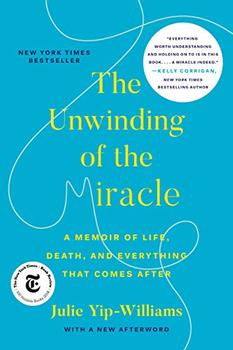Summary | Excerpt | Reviews | Beyond the book | Read-Alikes | Genres & Themes | Author Bio

A Doctor's Story of Love and Loss
by Rachel ClarkeIn Dear Life, palliative care specialist Dr. Rachel Clarke recounts her professional and personal journey to understand not the end of life, but life at its end.
Death was conspicuously absent during Rachel's medical training. Instead, her education focused entirely on learning to save lives, and was left wanting when it came to helping patients and their families face death. She came to specialize in palliative medicine because it is the one specialty in which the quality, not quantity of life truly matters.
In the same year she started to work in a hospice, Rachel was forced to face tragedy in her own life when her father was diagnosed with terminal cancer. He'd inspired her to become a doctor, and the stories he had told her as a child proved formative when it came to deciding what sort of medicine she would practice. But for all her professional exposure to dying, she remained a grieving daughter.
Dear Life follows how Rachel came to understand―as a child, as a doctor, as a human being―how best to help patients in the final stages of life, and what that might mean in practice.
Reading British doctor Rachel Clarke's memoir about her life and career in palliative care, I felt a sense of the support I wish I'd had then. Dear Life should be in hospital waiting rooms, in chemotherapy clinics, in doctors' offices where the bad news might come today or next week. I am relieved to discover this complete, gentle understanding of what my family and I went through when my father was dying. Clarke is an unassuming healer now for the thousands, or even millions of people that I hope will read this book...continued
Full Review
 (759 words)
(759 words)
(Reviewed by Rory L. Aronsky).
 In Dear Life, Dr. Rachel Clarke recalls being inspired to shift her medical career from emergency room work to palliative care after serving as a fierce advocate for Pat, her fiancé's dying mother. Cicely Saunders is widely credited with creating palliative care as we know it today. So what inspired Saunders to pursue this particular path?
In Dear Life, Dr. Rachel Clarke recalls being inspired to shift her medical career from emergency room work to palliative care after serving as a fierce advocate for Pat, her fiancé's dying mother. Cicely Saunders is widely credited with creating palliative care as we know it today. So what inspired Saunders to pursue this particular path?
Saunders was born in Barnet in North London in 1918. As a child she was afflicted by a crooked spine, a condition that caused considerable pain. She was also taller than all the other girls at her boarding school. These circumstances produced an affinity for outsiders that informed the rest of her life and her career.
Saunders wanted to be a nurse, but her father was staunchly against it, so ...

If you liked Dear Life, try these:

by Claire Oppert
Published 2024
A celebrated art therapist plays the cello for her patients—and offers a moving reflection on the extraordinary power of music to enrich our lives, all the way to the very end.

by Julie Yip-Williams
Published 2020
As a young mother facing a terminal diagnosis, Julie Yip-Williams began to write her story, a story like no other. What began as the chronicle of an imminent and early death became something much more - a powerful exhortation to the living.